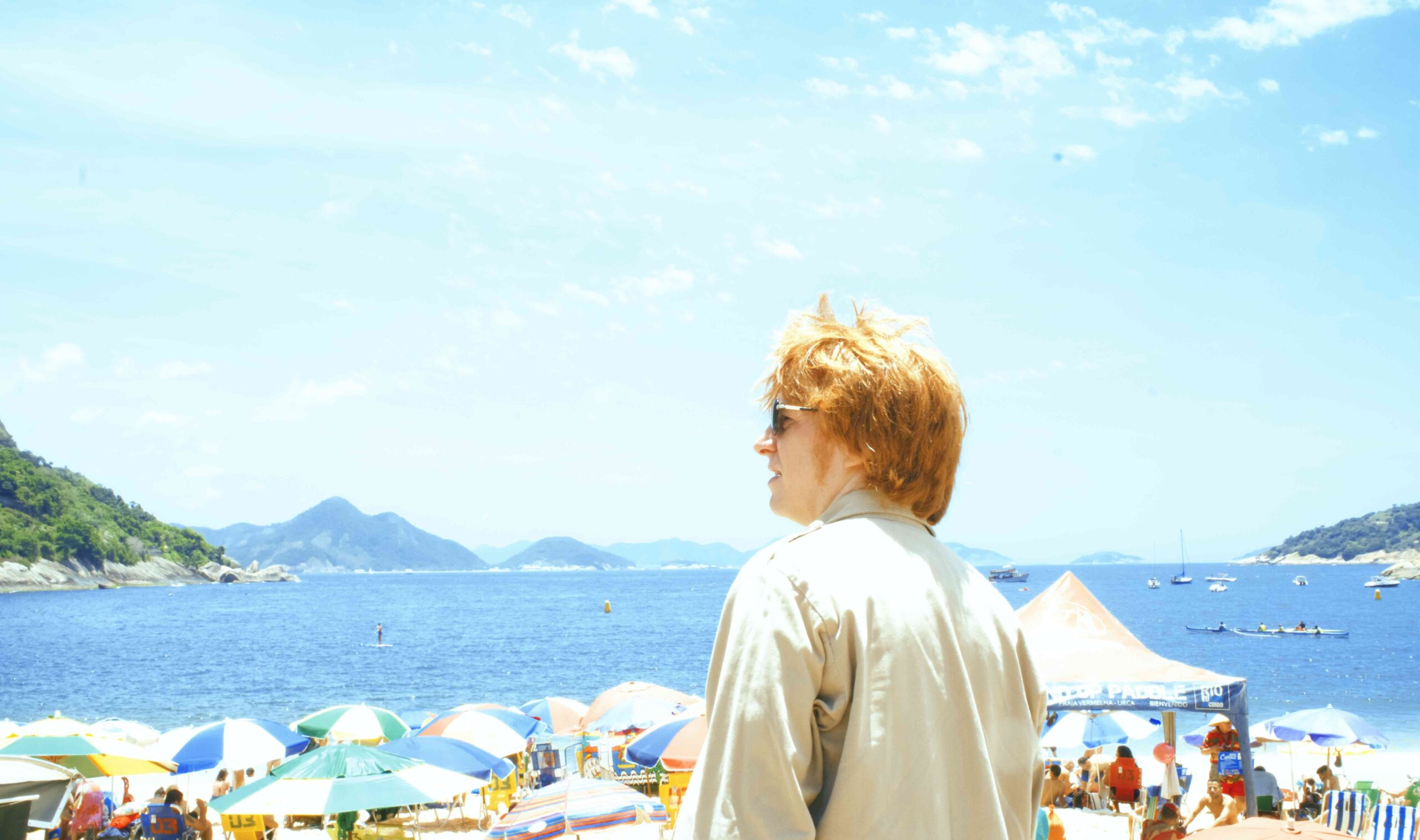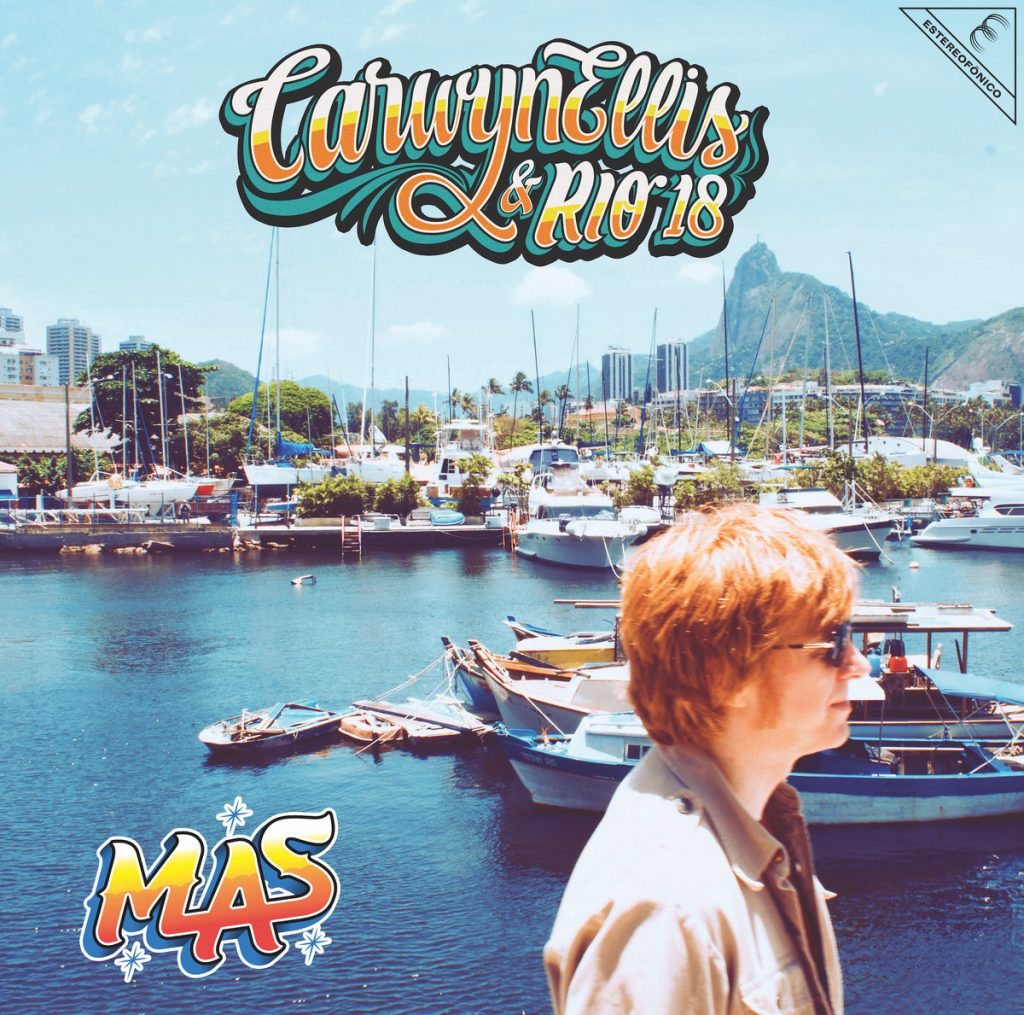Carwyn, with “Mas” you are continuing your voyage into South American music after your well acclaimed album “Joia!”. To record an album with South American music and Welsh vocals seems surprising at first. Listening to “Mas” you quickly realize how well music and language fit together. When did you first get the idea to mix these cultural spheres?
Well… I can’t really take the credit for the idea. It was suggested to me three years ago by Chrissie Hynde while the Pretenders were in Rio de Janeiro. We were just beginning a South American odyssey, on tour opening for Phil Collins. The first show was at the Maracana Stadium in Rio. Chrissie could see that I’d been record shopping already (this was only a couple of days after we’d arrived) and said she had wonderful musical friends in Rio, and that I should meet them – and maybe I should play music with them – and maybe I should record with them – and maybe we should do it in Welsh!!! How wild would that be??? And she was right. She invariably is. I’m so thankful to her for coming up with the idea, and for introducing me to Kassin, the phenomenal producer of the Rio 18 records, who is now my dear friend too.
“Mas” has three meanings: “out” in Welsh, “more” in Spanish, and “but” in Portuguese. Why did you choose this name?
Why not? All the meanings apply in different ways. I like the fact that the same word on paper can have different meanings in different places. And that we can have things in common which are also different… Joia, the first album title, means ‘Enjoy!’ In Welsh and ‘Groovy!’ In Brazilian.
On the album one literally follows you on a musical journey through the South American continent: you hear Brazilian Bossa Nova influences, Samba, Tropicália, Colombian Cumbia or Cuban Son reminiscences. Did you conceive the album as such a musical journey from the start?
Not really. But as we progressed, there were things that I really wanted to try. The process with these albums has been super fast: I received the call from Kassin saying he was free and available, around three or four weeks before we recorded. Both times. And in both instances, I wrote all the material in those weeks between the call and travelling to Rio. So a lot of things developed in the studio. There were definitely elements I wanted to incorporate, but they soon turned into whole stylistic adventures. I love experimenting and learning along the way.
Carwyn, the bulk of the album was already recorded in Rio de Janeiro at the end of 2019. Tell us a little about the recording sessions. What was it like to record in Rio? Did the atmosphere of this city inspire you creatively?
The atmosphere of my fellow musicians, and the one we created together – that was the most important. The fact that I’m having a wonderful time helps! Each time we recorded I was only there for about a week, so work is the main focus. But everyone is so fucking talented and fun that we get loads done, and I get just enough time to go out and explore a little. I’ve met some really fantastic people in Rio, who’ve shown me wonderful places and times. The studio sessions are informal and fun – we’re hanging out, but we’re also making sensational music together. Kassin and his place provide that warmth and freedom.
On “Mas” you collaborated with many exquisite musicians like Shawn Lee, in whose studio in London the album also received its final touches, and Elan and Marged Rhys. How important is creative exchange and collaboration for you?
It means a great deal to me, and I treasure these experiences. As someone who plays most of the instruments I need to use, I particularly value the people who surprise me and bring new things to the table. Shawn isn’t just a master musician, he’s a master creator – he has good ideas, and lots of them. We spark off each other, and we sound good together, whatever instruments we might be playing. Elan and Marged are not just great singers and harmonisers in their own right, they are sisters. And so the blends they create are their own, the kind that only families can make. They are better than perfect, and it’s a real privilege to be around that kind of magic. All the people you hear on the Rio 18 records are magical to me.
You actually planned to release the “Mas” next year. What made you decide to bring forward the album release? Did the pandemic play a role?
It certainly did! In 2020/21 I was supposed to be touring pretty solidly with the Pretenders but all that vanished. So I was fortunate that I’d recorded a bunch of music and had it already available to me. It’s given me a focus over the last year.
Besides themes like the pleasure of love, nature and humanity, your lyrics also deal with serious topics like climate change, migration and the rise of megacities. With “Ar Ôl Y Glaw” (After The Rain) you also wrote a new song for the album, which is a reaction to the terrible murder of George Floyd. How important is it to you to be also a chronicler of current developments and problems in the world with your music?
To be honest with you, I’ve never been much of a direct chronicler of current events in my music. I haven’t seen that as my role – I’ve always considered myself a musician/composer in a more abstract sense I suppose. But in recent years I’ve travelled a lot and seen so much, and these are turbulent times the whole world over. There’s a lot of upheaval happening. So I think the subject matters are more a way for me to process what I’ve seen and to offer a little perspective if anyone’s interested.
With many songs on “Mas” you can’t help but think of famous names of the South American music scene like Marcos Valle, Sérgio Mendes or Ray Barretto. Which artists have particularly influenced you? And what excites you in general about this kind of music?
The names you just suggested are a pretty good starting point! Obviously there’s a lot of artists whom I admire greatly and have tried to learn from, and that list grows all the time. I’m a massive fan of Quarteto Em Cy, the Brazilian quartet of singing sisters from Bahia. Their body of work is phenomenal, and their combination of sheer talent and technical sophistication coupled with the innocence and purity of their voices makes them my favourite vocal group. They amaze me. ‘Cynara’ on the new album is about one of the sisters, and the group as a whole. I was lucky enough to meet Cynara last time I was in Rio, along with Sonia, another long standing member of the group. They were lovely ladies.
Carwyn, about 750,000 people worldwide speak Welsh. You are aware that you reach fewer people with Welsh song lyrics than with English. Is that something you think about as a songwriter?
I don’t know if I reach fewer people because I’m singing in Welsh. For instance, I’m talking to you for the first time! This project has reached far and wide, and I think it might have something to do with like-minded, internationally-inclined people liking something new, wherever they are in the world. That in itself is important in a time when so many people and places are becoming more backward and inward looking. I still like to see a future where all languages and cultures are viewed as equals, and that it’s ok for people to live and work together, wherever they’re from. Honestly, this stuff is pretty basic for me and I’m still stunned that there are people who might not agree.
On the other hand, the album is a flagship for Welsh, which probably few people outside the UK have ever heard. Do you see yourself as an ambassador for your language?
No. It’s just my language. English is my language too. I speak a little of a few other languages as well. Languages are tools for communicating, and they have different nuances. And with this project, it wasn’t even my idea! But I’m really glad it’s happened. If it’s helped to raise any awareness of Wales and Welsh, and our place and possibilities in this world, then so much the better.
What’s next, Carwyn Ellis? Do you plan to tour with the album after Lockdown? Are there already new ideas for further albums?
I’m writing and recording constantly, so there’s plenty more to come. I hope we can tour after the restrictions are lifted – we’ll just have to wait and see I guess.
One last (not entirely serious) question: For all their cultural differences, are there qualities that Cardiff and Rio de Janeiro share? What about the temperament of the Welsh?
Aside from both cities being by the sea, we’re all very nice people. 🙂
Thank you very much for the interview, Carwyn!
You’re welcome, Thomas. Thanks for having me!
Photo: Fernando Neumeyer


